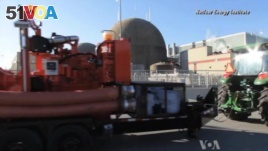February 19,2014
NEW YORK — In the midst of the current debate over whether to build the Keystone oil pipeline from Canada into the United States and the efforts to develop solar and wind power, nuclear energy is hardly being discussed. However, the Nuclear Energy Institute - an industry lobbying group -- reports the number of nuclear power plants in the United States is growing.
The big news is new facilities. Four are currently being constructed: two each in South Carolina and Georgia.

Steve Byrne, of South Carolina Electric and Gas, said that for his company, nuclear was a good option.
“Coal was in disfavor. The price of natural gas relatively high, so nuclear made a lot of sense to us. So we were a company that already operated a nuclear facility, had a tremendous site for adding new nuclear capacity, so we made the decision to go nuclear,” said Byrne.
South Carolina currently has seven operating reactors. Georgia has six, plus the two new ones under construction.
Stephen Kuczynski, chairman and CEO of Georgia’s Southern Nuclear Operating Company, pointed out the long-term soundness of a nuclear plant.
“We see these as 60-year assets. Nuclear plants are high construction, but very low operating. But if you look at that over a 40-to-60-year period, it’s a very economical option," said Kuczynski.
Several plants have closed because they were not competitive with other power sources -- mainly cheaper natural gas. NEI favors a diversity of power sources for the nation, but NEI head Marv Fertel warned that this is not happening.
"We are going all to gas because it’s cheap and it’s a good thing. But we are going all reliant on that and because of policies, we are driving renewables. So we are driving coal out because of environmental requirements and demands, and we are driving nuclear out for reasons that make no sense. And that’s not good for this country. We’re going to pay a price in reliability, a price in affordability, when the whole thing crashes,” warned Fertel.
Opposition to nuclear power is strong, with some surveys showing more than half of Americans are against building more nuclear plants primarily because of safety concerns.
Phillip Museguus, of the anti-nuclear group Riverkeeper, said that in terms of economics and costs, nuclear doesn’t really make sense.
"There are better ways to generate power; there are safe and cleaner ways. When you look at the price of natural gas in the U.S. economy, that is forcing many nuclear plants to close. Four nuclear facilities have closed in the past year and a half, so for the existing reactors, the economics are not good,” said Museguus.
Some 40 years ago, anti-nuclear groups like Riverkeeper began worldwide protests, but the Fukushima nuclear disaster of 2011 gave them more ammunition.
The industry refutes claims that nuclear power is unsafe or susceptible to terrorism.
“What we’ve done is we spent a fortune on security since 9-11. Nuclear plants, if you talk to the FBI or anybody else would tell you, are the most hardened targets in America. Our problem right now is that we think that adding more security in some areas makes no sense and what we need to do is look at the effectiveness of what we have," said Fertel.
As for the disposal of nuclear waste, that remains a contentious issue in the United States -- with Congress so far unable to agree on a solution.